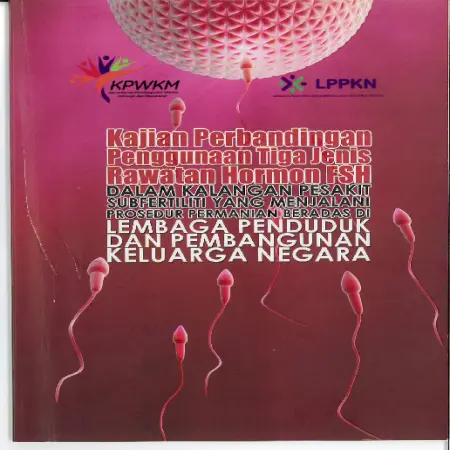TOPICS
Results for Topics : "Childcare"
|
|
Kajian perbandingan penggunaan tiga jenis rawatan hormon FSH dalam kalangan pesakit subfertiliti yang menjalani prosedur permanian beradas di Lembaga Penduduk dan Pembangunan Keluarga Negara
Item Type: Research Report
Editor:
Year: 02/01/2017
Abstract: Since 1979, the National Population and Family Development Board (NPFDB) has been providing subfertility management services to the public especially middle-income group. In line with the rapid pace of the latest technology and research developments, there are various types of fertility drugs in the form of injections which had been used in subfertility treatment. The main function of this injection is to mature the follicles where the main hormone contained in this injection is the follicle stimulating hormone (Follicle Stimulating Hormone, FSH). In general, there are three types of FSH injections, which is a recombinant FSH (rFSH) that have 100 percent synthetic hormone, urinary FSH (uFSH) that derived from menopausal urine and highly purified urinary FSH (hp-uFSH) that also derived from menopausal urine but more pure state than uFSH. All three hormones have FSH’s activities but uFSH and hp-uFSH also have Luteinizing Hormone’s activity (LH). Thus, NPFDB has taken initiative to conduct a comparative study on the use of three types of FSH hormone treatment, namely Gonal F (rFSH), Folliova (uFSH) and Menopur (hp-uFSH), among subfertilitie’s patient who’s undergoing Intrauterine Insemination Technique (IUI). Among others, the three types of hormones were studied in terms of effevtivenee and cost burden. The study sample was from patients with unknown cause of subfertilitie’s problem and they visit NPFDB Subfertilitie’s Clinic, Headquarters, from June 2010 to May 2012. The sampling method was random. The patient and researcher do not know the treatment regimen to be initiated until a closed sample containing the treatment regimen code number is opened by the patient before starting treatment. Data were collected, recorded and anlyzed using Statistical Package for the Social Sciences (SPSS) software. Although originally a total of 90 female patients were targeted to be recruited into this study. 30 patients for each type of FSH hormone, but at the end of the study only 39 patients met all eligibility criteria and agreed to participate in this study. The result showed that average of the patients was 28.3 years and the majority were ethnic Malays (76.9%). Most of the patients had a household income between RM 5,000.00 and RM 10,000.00 (51.4%). The percentage of patients requiring more than three injections to procedure mature follicles was lowest for Folliova (41.7%), compared with Menopur (50.0%) and Gonal F (55.6%). Similarly in terms of the number of follicles produced, the Folliova regime (58.3%) produced more follicles (more than three follicles) than other regimes. A total of 16.7 percent of patients who took Menopur injections were confirmed pregnant, while no pregnany occurred among patients who took Folliova and Gonal F. In terms of cost, at the time of this study, the price of three 75IU injections was RM 334.20 for Gonal F, RM 187.20 for Folliova and RM 271.20 for Menopur. In conclusion, this study shows that, hp-uFSH (Menopur) gives the highest pregnancy rate compared to Gonal F and Folliova. Furthemore, the price of Menopur is moderate (affordable) for patients. Therefore, highly purified urinary FSH is a good gonadotropin choice for couples with unexplained subfertility undergoing an IUI procedure and it may be the main choice for patients who need a combination fertility pill stimulation regimen and gonadotropin injections. As a suggestion, such a study should be conducted with a larger sample size to obtain more significant results and be representative of actual population.
|
|
|
|





